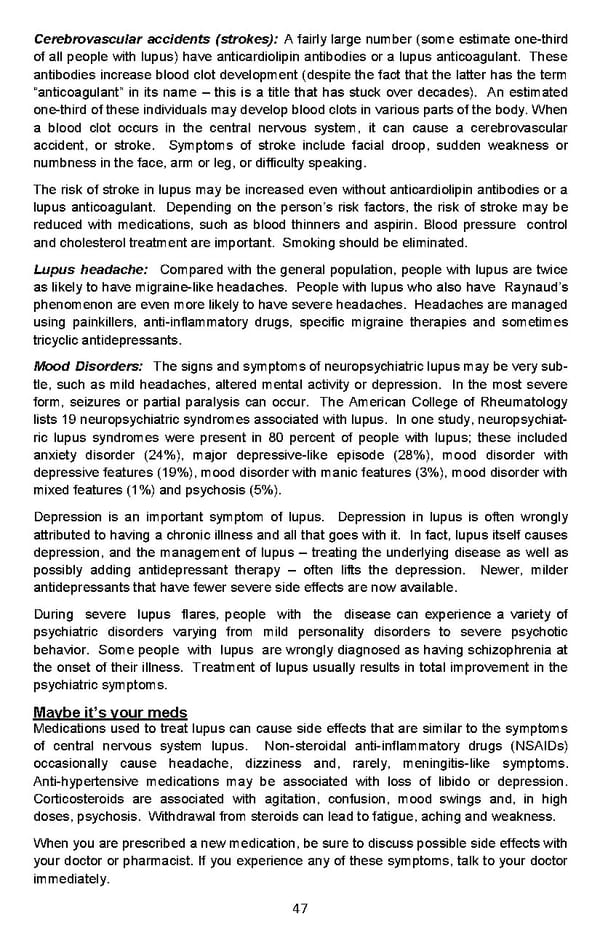Cerebrovascular accidents (strokes): A fairly large number (some estimate one-third of all people with lupus) have anticardiolipin antibodies or a lupus anticoagulant. These antibodies increase blood clot development (despite the fact that the latter has the term “anticoagulant” in its name – this is a title that has stuck over decades). An estimated one-third of these individuals may develop blood clots in various parts of the body. When a blood clot occurs in the central nervous system, it can cause a cerebrovascular accident, or stroke. Symptoms of stroke include facial droop, sudden weakness or numbness in the face, arm or leg, or difficulty speaking. The risk of stroke in lupus may be increased even without anticardiolipin antibodies or a lupus anticoagulant. Depending on the person’s risk factors, the risk of stroke may be reduced with medications, such as blood thinners and aspirin. Blood pressure control and cholesterol treatment are important. Smoking should be eliminated. Lupus headache: Compared with the general population, people with lupus are twice as likely to have migraine-like headaches. People with lupus who also have Raynaud’s phenomenon are even more likely to have severe headaches. Headaches are managed using painkillers, anti-inflammatory drugs, specific migraine therapies and sometimes tricyclic antidepressants. Mood Disorders: The signs and symptoms of neuropsychiatric lupus may be very sub- tle, such as mild headaches, altered mental activity or depression. In the most severe form, seizures or partial paralysis can occur. The American College of Rheumatology lists 19 neuropsychiatric syndromes associated with lupus. In one study, neuropsychiat- ric lupus syndromes were present in 80 percent of people with lupus; these included anxiety disorder (24%), major depressive-like episode (28%), mood disorder with depressive features (19%), mood disorder with manic features (3%), mood disorder with mixed features (1%) and psychosis (5%). Depression is an important symptom of lupus. Depression in lupus is often wrongly attributed to having a chronic illness and all that goes with it. In fact, lupus itself causes depression, and the management of lupus – treating the underlying disease as well as possibly adding antidepressant therapy – often lifts the depression. Newer, milder antidepressants that have fewer severe side effects are now available. During severe lupus flares, people with the disease can experience a variety of psychiatric disorders varying from mild personality disorders to severe psychotic behavior. Some people with lupus are wrongly diagnosed as having schizophrenia at the onset of their illness. Treatment of lupus usually results in total improvement in the psychiatric symptoms. Maybe it’s your meds Medications used to treat lupus can cause side effects that are similar to the symptoms of central nervous system lupus. Non-steroidal anti-inflammatory drugs (NSAIDs) occasionally cause headache, dizziness and, rarely, meningitis-like symptoms. Anti-hypertensive medications may be associated with loss of libido or depression. Corticosteroids are associated with agitation, confusion, mood swings and, in high doses, psychosis. Withdrawal from steroids can lead to fatigue, aching and weakness. When you are prescribed a new medication, be sure to discuss possible side effects with your doctor or pharmacist. If you experience any of these symptoms, talk to your doctor immediately. 47
 Living Well With Lupus Facts Booklet Page 46 Page 48
Living Well With Lupus Facts Booklet Page 46 Page 48